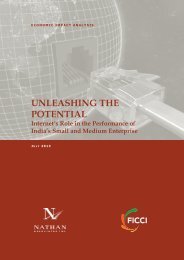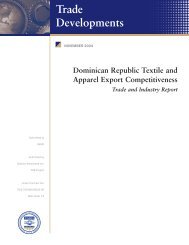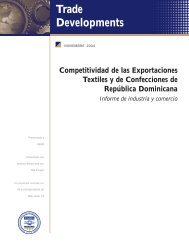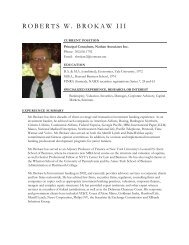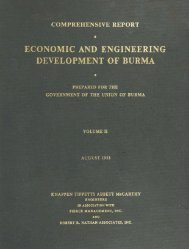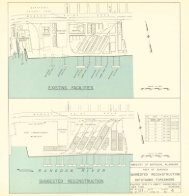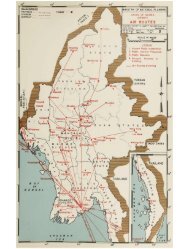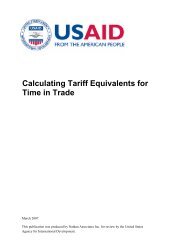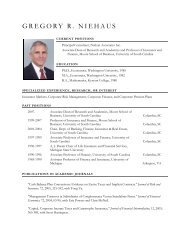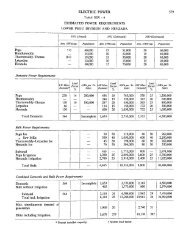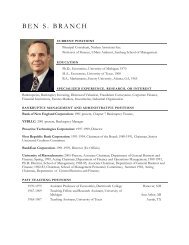Putting it to Work in Developing Countries - Nathan Associates
Putting it to Work in Developing Countries - Nathan Associates
Putting it to Work in Developing Countries - Nathan Associates
Create successful ePaper yourself
Turn your PDF publications into a flip-book with our unique Google optimized e-Paper software.
Exhib<strong>it</strong> 5-4<br />
Can EPZs Violate WTO Rules<br />
How an EPZ assists exports may const<strong>it</strong>ute a<br />
violation of the WTO Agreement on Subsidies<br />
and Countervail<strong>in</strong>g Measures (SCM), which<br />
<strong>to</strong>ok effect <strong>in</strong> 1995. A subsidy is<br />
• Prohib<strong>it</strong>ed if <strong>it</strong> is cont<strong>in</strong>gent on export<br />
performance or requires the use of domestic<br />
<strong>in</strong>stead of imported <strong>in</strong>puts;<br />
• Actionable if <strong>it</strong> harms another WTO<br />
member; or<br />
• Nonactionable if <strong>it</strong> is general, not granted <strong>to</strong><br />
a specific sec<strong>to</strong>r or producer, or if <strong>in</strong>tended<br />
<strong>to</strong> enable scientific research, benef<strong>it</strong> disadvantaged<br />
regions, or encourage adoption of<br />
environmental regulations.<br />
Prohib<strong>it</strong>ed subsidies <strong>in</strong>clude the government<br />
transferr<strong>in</strong>g funds directly <strong>to</strong> exporters, provid<strong>in</strong>g<br />
goods and services other than <strong>in</strong>frastructure,<br />
and reduc<strong>in</strong>g or elim<strong>in</strong>at<strong>in</strong>g taxes. Tax<br />
breaks for export<strong>in</strong>g firms, <strong>in</strong>clud<strong>in</strong>g duty<br />
exemptions on imported mach<strong>in</strong>ery used <strong>to</strong><br />
produce goods for exports—measures common<br />
<strong>in</strong> EPZs—may be considered prohib<strong>it</strong>ed if<br />
granted <strong>to</strong> a specific sec<strong>to</strong>r.<br />
When the effect of the subsidies on other<br />
WTO members is m<strong>in</strong>imal, develop<strong>in</strong>g countries<br />
are treated more liberally than developed<br />
countries. For example, even though export<br />
subsidies were prohib<strong>it</strong>ed as of January 1,<br />
2003, develop<strong>in</strong>g countries could request a<br />
one-year extension and consult w<strong>it</strong>h the<br />
Comm<strong>it</strong>tee on Subsidies and Countervail<strong>in</strong>g<br />
Measures <strong>to</strong> determ<strong>in</strong>e whether an extension is<br />
justified. More than 24 requested extensions,<br />
<strong>in</strong>clud<strong>in</strong>g Colombia, Guatemala, Panama and<br />
Thailand. Extensions may last through the<br />
end of 2007. In add<strong>it</strong>ion, least-developed<br />
countries may reta<strong>in</strong> export performance subsidies<br />
as long as they rema<strong>in</strong> under the <strong>in</strong>come<br />
threshold (as def<strong>in</strong>ed by UNCTAD, plus<br />
WTO members w<strong>it</strong>h per cap<strong>it</strong>a <strong>in</strong>comes of<br />
under $1,000 per annum).<br />
<strong>Countries</strong> that may be exempt from the SCM<br />
Agreement or portions of <strong>it</strong> are as follows:<br />
Least-Developed and Develop<strong>in</strong>g <strong>Countries</strong>.<br />
Angola, Bangladesh, Ben<strong>in</strong>, Burk<strong>in</strong>a Faso,<br />
Burundi, Cambodia, Central African Republic,<br />
Chad, Democratic Republic of the Congo,<br />
Djibouti, Gambia, Gu<strong>in</strong>ea, Gu<strong>in</strong>ea-Bissau,<br />
Ha<strong>it</strong>i, Lesotho, Madagascar, Malawi, Maldives,<br />
Mali, Maur<strong>it</strong>ania, Mozambique, Myanmar,<br />
Nepal, Niger, Rwanda, Senegal, Sierra Leone,<br />
Solomon Islands, Tanzania, Togo, Uganda,<br />
Zambia.<br />
Certa<strong>in</strong> Develop<strong>in</strong>g <strong>Countries</strong> (as long as GNP<br />
per cap<strong>it</strong>a does not exceed $1,000 for three<br />
consecutive years, at constant 1990 dollars).<br />
Bolivia, Cameroon, Congo, Cote d’Ivoire,<br />
Dom<strong>in</strong>ican Republic, Egypt, Ghana,<br />
Guatemala, Guyana, India, Indonesia, Kenya,<br />
Morocco, Nicaragua, Nigeria, Pakistan,<br />
Philipp<strong>in</strong>es, Senegal, Sri Lanka, Zimbabwe.<br />
Develop<strong>in</strong>g and least developed countries seek<strong>in</strong>g<br />
<strong>to</strong> jo<strong>in</strong> the WTO may meet the qualifications<br />
for exemption, but current members may<br />
ask applicants <strong>to</strong> modify or elim<strong>in</strong>ate export<br />
subsidy programs. For example, Cambodia, an<br />
LDC, agreed <strong>to</strong> modify or elim<strong>in</strong>ate a program<br />
that provided exemptions on import duties <strong>to</strong><br />
certa<strong>in</strong> <strong>in</strong>ves<strong>to</strong>rs.<br />
SOURCES: David Robertson, 2001. Export Process<strong>in</strong>g Zones and the WTO Agreement on Subsidies and<br />
Countervail<strong>in</strong>g Measures. In International Tax Compet<strong>it</strong>ion: Globalization and Fiscal Sovereignty. Ed<strong>it</strong>ed by Rajiv Biswas.<br />
2002. Commonwealth Secretariat: London.WTO Agreement on Subsidies and Countervail<strong>in</strong>g Measures, and WTO<br />
Decision on Implementation-related Issues and Concerns. www.w<strong>to</strong>.org, accessed November 30, 2006.WTO.<br />
Report of the <strong>Work</strong><strong>in</strong>g Party on the Accession of Cambodia. August 15, 2003, WT/ACC/KHM/21.<br />
65



